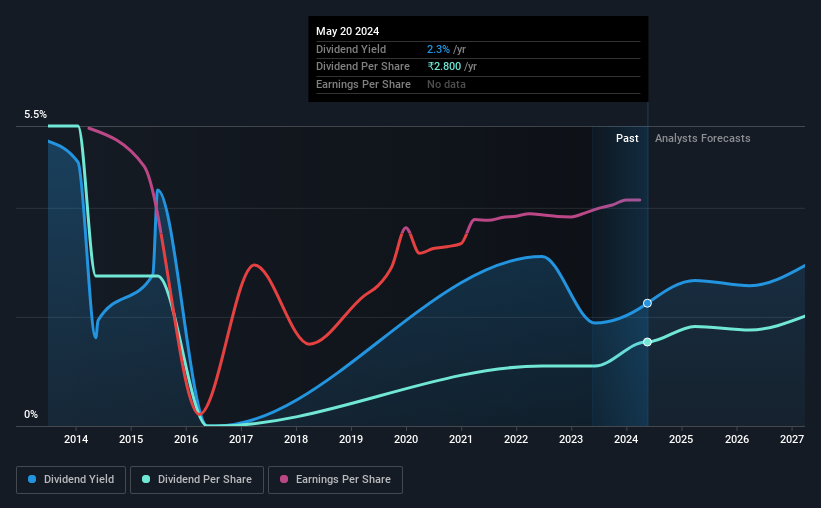Bank of India's (NSE:BANKINDIA) Dividend Will Be Increased To ₹2.80

Bank of India Limited's (NSE:BANKINDIA) dividend will be increasing from last year's payment of the same period to ₹2.80 on 25th of July. This takes the dividend yield to 2.3%, which shareholders will be pleased with.
See our latest analysis for Bank of India
Bank of India's Payment Expected To Have Solid Earnings Coverage
We like to see robust dividend yields, but that doesn't matter if the payment isn't sustainable.
Bank of India has established itself as a dividend paying company with over 10 years history of distributing earnings to shareholders. Using data from its latest earnings report, Bank of India's payout ratio sits at 18%, an extremely comfortable number that shows that it can pay its dividend.
Over the next 3 years, EPS is forecast to expand by 18.1%. The future payout ratio could be 20% over that time period, according to analyst estimates, which is a good look for the future of the dividend.

Dividend Volatility
Although the company has a long dividend history, it has been cut at least once in the last 10 years. The dividend has gone from an annual total of ₹10.00 in 2014 to the most recent total annual payment of ₹2.80. This works out to a decline of approximately 72% over that time. A company that decreases its dividend over time generally isn't what we are looking for.
The Dividend Looks Likely To Grow
Given that the track record hasn't been stellar, we really want to see earnings per share growing over time. We are encouraged to see that Bank of India has grown earnings per share at 67% per year over the past five years. Earnings have been growing rapidly, and with a low payout ratio we think that the company could turn out to be a great dividend stock.
An additional note is that the company has been raising capital by issuing stock equal to 11% of shares outstanding in the last 12 months. Trying to grow the dividend when issuing new shares reminds us of the ancient Greek tale of Sisyphus - perpetually pushing a boulder uphill. Companies that consistently issue new shares are often suboptimal from a dividend perspective.
Bank of India Looks Like A Great Dividend Stock
In summary, it is always positive to see the dividend being increased, and we are particularly pleased with its overall sustainability. Distributions are quite easily covered by earnings, which are also being converted to cash flows. All of these factors considered, we think this has solid potential as a dividend stock.
Companies possessing a stable dividend policy will likely enjoy greater investor interest than those suffering from a more inconsistent approach. At the same time, there are other factors our readers should be conscious of before pouring capital into a stock. For instance, we've picked out 2 warning signs for Bank of India that investors should take into consideration. Looking for more high-yielding dividend ideas? Try our collection of strong dividend payers.
Valuation is complex, but we're here to simplify it.
Discover if Bank of India might be undervalued or overvalued with our detailed analysis, featuring fair value estimates, potential risks, dividends, insider trades, and its financial condition.
Access Free AnalysisHave feedback on this article? Concerned about the content? Get in touch with us directly. Alternatively, email editorial-team (at) simplywallst.com.
This article by Simply Wall St is general in nature. We provide commentary based on historical data and analyst forecasts only using an unbiased methodology and our articles are not intended to be financial advice. It does not constitute a recommendation to buy or sell any stock, and does not take account of your objectives, or your financial situation. We aim to bring you long-term focused analysis driven by fundamental data. Note that our analysis may not factor in the latest price-sensitive company announcements or qualitative material. Simply Wall St has no position in any stocks mentioned.
About NSEI:BANKINDIA
Bank of India
Provides various banking products and services in India and internationally.
Proven track record with adequate balance sheet and pays a dividend.
Market Insights
Community Narratives




